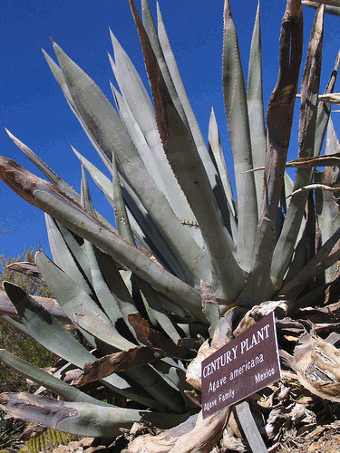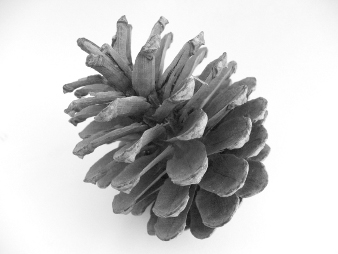Gardening
Tidbits: Those Little Facts You May Not Know
By Nikki Phipps
Gardening
has long since been practiced by many, and oftentimes the knowledge of
which is passed down throughout generations. However, to even the most
seasoned gardeners, there are those little bits of information and interesting
facts which
those before us may not have revealed.
 How
often does a Century Plant flower?
How
often does a Century Plant flower?
Photo
by crume
Most gardeners, new and
experienced, know how much flowers rely on bees and other pollinating
insects in order to thrive, but were you aware that many types of
insects are actually dependent on flowers as well? In fact, without
flowers, these insects would die due to a lack of protein or
carbohydrates. Plants have many flowering habits; yet, there are a few
of which some may not know. While most plants produce flowers each
year, did you know that the century plant (agave americana) will only
produce one flower in its lifetime after a time period of several
years? Once the flower has bloomed, however, the plant dies. Were you
aware of the fact that of the various types of bamboo, those belonging
to the same species bloom at the exact time, regardless of their
whereabouts? Everyone knows that flowers come in many shapes, colors,
and sizes. Even so, some of us may not have been aware that the largest
flower, called Rafflesia, can reach up to three feet in size or that
the smallest flowering plant, called common watermeal (wolffia
columbiana), is only about one millimeter. Did you know that while the
common sunflower may appear quite large, it is actually made up of
hundreds of tiny flowers, all of which produce seeds?
 What
weather does an open Pinecone predict?
What
weather does an open Pinecone predict?
Picture
by Gokhan Okur (gokoroko)
Most plants, of course,
should not be eaten. For instance, the Hydrangea, a commonly grown
bush, is quite toxic if eaten. This plant contains a substance call
hydrangin, which produces cyanide once broken down. Also, beware of
those seeds you might be consuming. Those coming from the Castor-oil
plant can be fatal; it takes just one bean from the plant to kill an
adult. On the other hand, many types of plants are edible. For example,
did you know that whenever you ingest a fig, you are actually eating a
flower? Quite often dandelions are eaten once cooked, and in England
these ‘flowers’ have been declared endangered wildflowers. In
actuality, dandelions are weeds. Weeds are typically labeled simply as
plants that grow in unwanted places. Weeds are also commonly associated
with superstitions, such as buttercups foretelling your taste for
butter or four-leaf clovers bringing good luck. Did you know that weeds
can also help evaluate your soil needs? The presence of sorrel within
your landscape may indicate dry soil while the presence of nettle
points to poor drainage. Chickweed, although a nuisance, often means
the soil is quite fertile.
Traditionally common
among gardeners is weather lore. While most people have heard various
tales, such as upturned leaves on trees foretelling approaching rain or
the black stripe of the woolly worm predicting a good or bad winter,
did you know that when spiders are seen taking down their webs, it is
said to mean a storm is imminent or seeing caterpillars in late fall
indicates a mild winter? Pinecones, as well, help predict weather. If a
pinecone is seen closed, rain is on the way while an opened pinecone
indicates warm, dry conditions.
Vegetable gardening has
always been popular among those with a fondness for plants, but did you
know that many commonly grown plants are not what you thought they
were? For instance, banana trees are actually considered herbs. Ever
heard of banana oil? This product has nothing to do with bananas at
all; the oil is produced from petroleum. A pineapple is really a berry,
as are oranges, lemons, watermelons, and tomatoes. Tomatoes were once
thought to be poisonous; in fact, the pilgrims considered growing them
to be an abomination. Yet, today these fruits are the most commonly
grown item in a garden. Were you aware that most peppers contain six
times as much vitamin C as oranges? An onion is really a lily as is
asparagus and many pumpkins are actually considered to be squash.
There have also been
certain issues deemed controversial today that were once widely
accepted. For example, tobacco was once grown for and prescribed to
people suffering from headaches, toothaches, arthritis, and bad breath.
Today, however, tobacco is known to cause many health problems,
including bad breath—ask a smoker. The herb plant, Marijuana, is
illegal now; however, did you know that two of our country’s
forefathers, George Washington and Thomas Jefferson, once grew this
plant on their plantations? Herbs
have long since been used for medicinal purposes, but you were aware
that it was once considered acceptable to sleep on thyme,
a popular kitchen herb, in order to cure those suffering from epilepsy?
The ever popular daisy has been long considered as the gardener’s best
friend. The flower is thought to treat bruises and sore backs. Did you
know that St. John's Wort was once forced in the mouth of accused
witches to make them confess or that throughout history has been used
by many cultures to exorcise demons and spirits?
Gardening has been
around for centuries, as have plants. However, did you know that ferns
have been around for nearly 300 million years or that the Creosote bush
dates back as far as 11,700 years? Were you aware that an oak tree is
nearly 50 years of age before it actually begins producing acorns? From
ancient times to the present, we have gardened and will continue to do
so, passing onto others that which we have learned. Yet, there may
still exist, along the way, those fascinating little things we never knew.

|
|